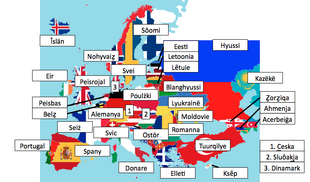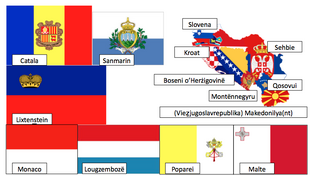| Progress 0% | ||||||||||||||||||||||||||||||||||||||||||||||||||||||||||||||||||||||||||||||||||||||||||||||||||||||
|
| ||||||||||||||||||||||||||||||||||||||||||||||||||||||||||||||||||||||||||||||||||||||||||||||||||||||
|
||||||||||||||||||||||||||||||||||||||||||||||||||||||||||||||||||||||||||||||||||||||||||||||||||||||
| Alamanalya limba alamanalya | |||
|---|---|---|---|
| Type | |||
| Agglutinative | |||
| Alignment | |||
| Nominative-Accusative | |||
| Head direction | |||
| Head-initial | |||
| Tonal | |||
| No | |||
| Declensions | |||
| Yes | |||
| Conjugations | |||
| Yes | |||
| Genders | |||
| No | |||
| Nouns decline according to... | |||
| Case | Number | ||
| Definiteness | Gender | ||
| Verbs conjugate according to... | |||
| Voice | Mood | ||
| Person | Number | ||
| Tense | Aspect | ||
General information[]
Phonology[]
Consonants[]
| Bilabial | Labio-dental | Dental | Alveolar | Post-alveolar | Palatal | Velar | Uvular | Glottal | |
|---|---|---|---|---|---|---|---|---|---|
| Nasal | m | t tʰ d | ɲ | k g | |||||
| Plosive | p b | n | c ɟ | ŋ | |||||
| Fricative | (f) v | ð s̪ z̪ | s z | (ʃ) ʒ | ç ʝ | x | ʁ | (h) ɦ | |
| Affricate | d͡ʒ | ||||||||
| Approximant | j | w | |||||||
| Trill | r | ||||||||
| Flap or tap | ɾ | ||||||||
| Lateral app. | l ɫ |
Vowels[]
| Front | Near-front | Central | Near-back | Back | |
|---|---|---|---|---|---|
| Close | i iː y | u uː | |||
| Near-close | ɪ | ||||
| Close-mid | e ø | ɤ o | |||
| Mid | ə | ||||
| Open-mid | ɔ | ||||
| Near-open | æ | ||||
| Open | a |
Alphabet[]
Standard Alphabet[]
| A | Ä | B | C | C̲ | D | Ḏ | E | Ë | Ẽ | F | G | Gy | Ġ | H | Hy |
| I | Î | J | J̲ | K | L | Ly | Ḻ | M | N | Ng | Ṅ | Ny | O | Ö | Õ |
| Ô | P | Q | R | Ry | S | S̲ | T | Th | U | V | X | Xy | Z | Ẕ | Ż |
Eastern Alphabet[]
| A | Ae | B | C | Ç | D | Dh | E | Ë | F | G | Gy | Gj | H | Hy | İ |
| I | J | Jh | K | Ky | L | Ly | Ll | M | N | Nc | Ng | Ny | Nz | O | Ö |
| Ø | P | R | Ry | Ṙ | S | Ş | T | Th | U | Ü | V | X | Z |
IPA Chart[]
| Letter (Standard) |
Letter (Eastern) |
IPA Value | Name | Notes |
|---|---|---|---|---|
| A a | a | a | ||
| Ä ä | Ae ae | æ | a-laut | Only used in loanwords |
| B b | b | ba | ||
| C c | Ns ns | s̪ | ciq | /s̃/ in educated speech |
| C̲ c̲ | Ç ç | t͡ʃ | c̲iq | |
| D d | Dh dh | ð | de | |
| Ḏ ḏ | D d | d | ḏe | |
| E e | e | e | ||
| Ë ë | ə | s̲va | Silent at the end of a word (c̲apë /t͡ʃap/, corn) | |
| Ẽ ẽ | I ı | ɪ | ec̲euv | Only used in loanwords |
| F f | f | fa | Only used in loanwords | |
| G g | g | ge | ||
| Gy gy | ɟ | gye | ||
| Ġ ġ | Gj gj | d͡ʒ | ġota | |
| H h | Hy hy | h | hec̲ | Only used in loanwords |
| Hy hy | H h | ɦ | hec̲-ipsiloṅ | |
| I i | İ i | i | i | |
| Î î | Ü ü | y | î | |
| J j | Jh jh | ç | jec̲ | |
| J̲ j̲ | J j | ʝ | j̲ec̲ | |
| K k/ḵ* | K k/kc* | k c | kec̲ | /c/ at the end of a word, /k/ otherwise |
| L l | l | la | ||
| Ly ly | İ i | j | elyj̲ | |
| Ḻ ḻ | Ll ll | ɫ | ḻel | Only used in loanwords |
| M m | m | eme | ||
| N n | n | ene | ||
| Ng ng | ng ŋ | nga | /ng/ at the beginning of a word, /ŋ/ medial or final | |
| Ṅ ṅ | (none) | ˜ | nasali | Nasal vowels are non-existant in the Eastern dialect |
| Ny ny | ɲ | enye | ||
| O o | o | o | /u/ at the end of a word or in the penultimate syllable, after "u" or "î" and after /o/; /ɔ/ after "a" and "ö", and before "ly"; /o/ in all other cases | |
| Ö ö | ø | ö | ||
| Õ õ | Ø ø | ɤ iː | oc̲euv | /iː/ at the beginning of a word; /ɤ/ elsewhere |
| Ô ô | V v | w v | haqono | Only used in loanwords. /w/ in the standard dialect, /v/ in the eastern dialect |
| P p | p | pî | ||
| Q q | Ky ky | c kʼ | qu | /kʼ/ when at the end of a word and in the word q' (or), /c/ otherwise |
| R r | ɾ | ru | /r/ in educated speech | |
| Ry ry | ɾ | ryu | ||
| S s | s | si | ||
| S̲ s̲ | Ş ş | ʃ | s̲i | Only used in loanwords |
| T t | t | te | ||
| Th th | tʰ tʼ | the | /tʼ/ when at the end of a word and in the word t' (by), /tʰ/ otherwise | |
| U u | u | u | Mostly used in loanwords and diphthongs | |
| V v | v | vi | ||
| X x | Ch ch | x | ix | |
| Xy xy | Gh gh | ʁ | ġelix | |
| Z z | z | ze | ||
| Ẕ ẕ | C c | ʒ | ẕe | |
| Ż ż | Nz nz | z̪ | żek | /z̃/ in educated speech |
*At the end of the word, when a /k/ sound is made, it is written as ḵ (standard) or kc (Eastern).
There is also one trigraph not included in the alphabet: skj /ɧ/
Vowel Length and Diphthongs[]
Vowels are often regular length (hence explaining the low amount of words beginning in õ and those containing "u"), but they can be lengthened. Just like in Estonian and Finnish orthography, this is done by writing the vowel twice. For example:
tîḏruke (girl) - /tydru.ke/ vs. tîḏruuke (quilt) - /tydruːke/
mõke (steel) - /mɤke/ vs. mõõke (waterfall) - /mɤːke/
Diphthongs are also quite rare, but do occur at times. Diphthongs with the sound ɪ are usually made with the letter ly rather than i.
| Diphthong | IPA Value |
|---|---|
| ae | æ |
| ai | eɪ |
| au | au̯ |
| ei | aɪ |
| eu | eu̯ |
| ie | iː |
| îö | yø |
| oa | ɒ |
| ou | u |
| ui | øː |
| uu | yː |
Stress[]
Stress in Alamanalya is not in a fixed position. Instead, it has a more melodious flow, similar to Swedish and Italian. The stress is often on every third syllable, or on the penultimate syllable of each word.
For example:
Piac̲aarain konan zde-aalpeḏeḏi. (The raindrops fell rather softly.) (colloquially pronounced: /pʰaˈt͡ʃaːɹeɪ̃ ˈkoˑ.nã ʒeɪ.aːlpeˈðeɪˑɾiˑ/, formally pronounced: /pʲaˈt͡ʃaːreɪn ˈkona zde.ˈaːlpeˈdedi/)
Gyooarain qëbavõn zde-aalpeḏeḏi. (The snowflakes drifted rather softly.) (colloquially pronounced: /gʲu.raɪ.ˈeɪ̃ː kʼˈbaˑvɤ̃ ˈʒeɪ.aːlpeˈðeɪˑɾiˑ/, formally pronounced: /ɟoː.ˈareɪn cəˈbavɤn zˈde.aːlpeˈdedi)
Formal and Colloquial Pronunciation[]
The standard dialect and the Eastern dialect vary quite a lot in vocabulary, but the two dialects have similar pronunciations, on in educated and colloquial speech. This article is written with formal IPA and standard vocabulary, unless where stated otherwise. Colloquial pronunciation varies in the following ways, plus several others depending on the area:
- Stops /p/ and /b/ are pronounced /pʰ/ and /bʰ/, respectively, before /a/, /e/, /i/, and /ø/
- Trill /r/ often becomes approximant /ɹ/ in the initial and medial positions
- The nasal consonant /n/ often becomes /˜/ in the final position
- In unusual consonant clusters beginning with /s/ or /z/, such as /sg/ or /zv/, the cluster is pronounced /ʃ/ or /ʒ/; in such clusters beginning with /t/ or /d/, such as /tk/ or /dl/, it is pronounced /θ/ or /ð/; in clusters beginning with /k/ or /g/, such as /kx/ or /gp/, it is pronounced /ʝ/; in clusters beginning with /p/ or /b/, it is pronounced /m/; in clusters beginning with /v/, it is pronounced /ʃ/; in clusters beginning with /l/, /j/, or /ɫ/, is it pronounced /ʎ/; and in clusters beginning with /r/, /ɾ/, /ʁ/, /x/, /ɦ/, /ɧ/, or /ð/, it is pronounced /ɧ/
- Examples
- zceraqamë /ʒeɹak.ʔam/
- tkormis /θoˑɾmis/
- gpauv /ʝau̯v/
- vqangiipge /ʃaˑŋiːme/
- xyvuilyjastou /ɧøːʎaˑʃu/
- Examples
- Stop /ɟ/ becomes /gʲ/ and /c/ becomes /kʼ/ in all cases
- Stop /d/ often becomes /ð/ or /ɾ/
- Medium-length vowels, such as /yˑ/, are placed at times, with no certain pattern
- Diphthong /eɪ/ and long vowel /iː/ usually has a short /aɪ/ preceding it
- /x/ and /ʁ/ become /j/
Grammar[]
| Gender | Cases | Numbers | Tenses | Persons | Moods | Voices | Aspects | |
|---|---|---|---|---|---|---|---|---|
| Verb | No | No | Yes | Yes | Yes | Yes | No | No |
| Nouns | No | Yes | Yes | No | No | No | No | No |
| Adjectives | No | No | No | No | No | No | No | No |
| Numbers | No | No | Yes | No | No | No | No | No |
| Participles | No | No | No | Yes | Yes | No | No | No |
| Adverb | No | No | No | No | No | No | No | No |
| Pronouns | No | Yes | Yes | No | Yes | No | No | No |
| Adpositions | No | No | No | No | No | No | No | No |
| Article | No | Yes | Yes | No | No | No | No | No |
| Particle | No | No | No | No | No | No | No | No |
Nouns[]
There are four classes of nouns: those ending in -is (I, or clanaun), those ending in -a, -e, or -ë (II, or clanadî), those ending in -î or -õ (III, or clanathalyar), and those ending in -o, -ou, or -ly (IV, or clanavist). They can be declined into eight cases: nominative (NOM), accusative/dative (AC/D), genitive (GEN), prepositional (PRE), instrumental (INS), comitative (COM), ablative (ABL), and semblative/translative (SE/T). They are also declined by number, either singular, dual, or plural, when no article or other means of disambiguation are attached. When there is an article, the singular form is always used.
See also: Examples of the Declination of Nouns
Class I Noun Declination[]
|
-is |
Singular | Dual | Plural |
|---|---|---|---|
| NOM | -is | -os | -es |
| AC/D | -ist | -ista | -iste |
| GEN | -in | -ina | -ine |
| PRE | -il | -ila | -ile |
| INS | -igy | -ig | -ige |
| COM | -it | -itha | -ite |
| ABL | -i | -ika | -ik |
| SE/T | -ir | -iry | -e |
| -i | Singular | Dual | Plural |
|---|---|---|---|
| NOM | -i | -is | -ise |
| AC/D | -ist | -ista | -iste |
| GEN | -in | -ina | -ine |
| PRE | -il | -ila | -ile |
| INS | -igy | -ig | -ige |
| COM | -it | -itha | -ite |
| ABL | -i | -ika | -ik |
| SE/T | -ir | -iry | -i |
| -ö | Singular | Dual | Plural |
|---|---|---|---|
| NOM | -ö | -ös | -öse |
| AC/D | -ist | -ista | -iste |
| GEN | -in | -ina | -ine |
| PRE | -il | -ila | -ile |
| INS | -igy | -ig | -ige |
| COM | -it | -itha | -ite |
| ABL | -i | -ika | -ik |
| SE/T | -ir | -iry | -ö |
Class II Noun Declination[]
|
-a |
Singular | Dual | Plural |
|---|---|---|---|
| NOM | -a | -u | -o |
| AC/D | -et | -ete | -eta |
| GEN | -ant | -ante | -anta |
| PRE | -el | -ele | -ela |
| INS | -aġ | -aġe | -aġa |
| COM | -ath | -athe | -atha |
| ABL | -aq | -aqe | -aqa |
| SE/T | -anka | -ale | -ala |
| -e | Singular | Dual | Plural |
|---|---|---|---|
| NOM | -e | -u | -o |
| AC/D | -et | -ete | -eta |
| GEN | -ant | -ante | -anta |
| PRE | -el | -ele | -ela |
| INS | -aġ | -aġe | -aġa |
| COM | -ath | -athe | -atha |
| ABL | -ak | -aqe | -aqa |
| SE/T | -anka | -ale | -eli |
| -ë | Singular | Dual | Plural |
|---|---|---|---|
| NOM | -ë | -u | -o |
| AC/D | -ët | -ëte | -ëta |
| GEN | -ant | -ante | -anta |
| PRE | -ël | -ële | -ëla |
| INS | -aġ | -aġe | -aġa |
| COM | -ath | -athe | -atha |
| ABL | -aq | -aqe | -aqa |
| SE/T | -anka | -ale | -ala |
Class III Noun Declination[]
| -î | Singular | Dual | Plural |
|---|---|---|---|
| NOM | -î | -u | -o |
| AC/D | -õt | -õte | -õti |
| GEN | -õn | -õne | -õni |
| PRE | -il | -ila | -ile |
| INS | -igy | -ig | -i |
| COM | -ith | -ite | -idi |
| ABL | -ev | -eve | -eryi |
| SE/T | -en | -el | -î |
| -õ | Singular | Dual | Plural |
|---|---|---|---|
| NOM | -õ | -u | -o |
| AC/D | -õt | -õte | -õti |
| GEN | -õn | -õne | -õni |
| PRE | -il | -ila | -ile |
| INS | -iṅ | -ig | -i |
| COM | -ith | -ite | -idi |
| ABL | -ev | -eve | -eryi |
| SE/T | -en | -el | -î |
Class IV Noun Declination[]
| -o | Singular | Dual | Plural |
|---|---|---|---|
| NOM | -o | -i | -es |
| AC/D | -ost | -osto | -osta |
| GEN | -ont | -onto | -onta |
| PRE | -ol | -olo | -ola |
| INS | -osle | -oslo | -osla |
| COM | -ot | -oto | -ota |
| ABL | -ov | -oc̲ | -ova |
| SE/T | -oka | -ola | -ovii |
| -ou | Singular | Dual | Plural |
|---|---|---|---|
| NOM | -ou | -u | -ous |
| AC/D | -ost | -osto | -osta |
| GEN | -ont | -onto | -onta |
| PRE | -ol | -olo | -ola |
| INS | -osle | -oslo | -osla |
| COM | -ot | -oto | -ota |
| ABL | -ov | -oc̲ | -ova |
| SE/T | -oka | -ola | -ovii |
| -ly | Singular | Dual | Plural |
|---|---|---|---|
| NOM | -ly | -li | -lyes |
| AC/D | -lyost | -lyosto | -lyosta |
| GEN | -lyont | -lyonto | -lyonta |
| PRE | -lyol | -lyolo | -lyola |
| INS | -lyosle | -lyoslo | -lyosla |
| COM | -lyot | -lyoto | -lyota |
| ABL | -lyov | -lyoc̲ | -lyova |
| SE/T | -lyoka | -lyola | -lyovii |
Articles[]
The definite article is attached as a suffix, while the indefinite article is a separate word placed before the noun. If the first letter of the article is a vowel, it is left out when added as a suffix to a noun ending in a vowel. The opposite applies to nouns ending in a consonant.
| Singular | Dual | Plural | |
|---|---|---|---|
| Nominative | er | ek | em |
| Accusative/Dative | va | ve | vo |
| Genitive | ere | eke | eme |
| Prepositional | et | en | em |
| Instrumental | ena | ene | eme |
| Comitative/Semblative | eto | elo | eno |
| Ablative | ete | el | la |
Pronouns[]
Personal pronouns are declined into five cases. They are not marked by gender. The genitive pronoun, as a suffix or a separate word after a noun, also is used for possession.
In the chart below, (S) represents the singular form, and (P) represents the plural form.
| 1, S | 2, S | 3, S | 1, P | 2, P | 3, P | 4 | |
|---|---|---|---|---|---|---|---|
| Nominative | mi | tî | lya | żo | so | lye | de |
| Accusative/Dative | ni | dî | go | że | sa | ge | po |
| Genitive/Instrumental | im | ît | aly | oż | os | ely | ed |
| Prepositional/Comitative | imot | îtot | akot | ożot | olyt | ekot | ejit |
| Ablative | imor | îtor | akor | ożor | olye | ekor | qir |
| Semblative | imo | îto | ako | ożo | oly | eko | qi |
Verbs[]
Verbs have two infinitive endings: -ad, and -õd. There are four tenses: present, past, future, and imperative.
| -ad | Present | Past | Future | Imperative |
|---|---|---|---|---|
| Mi | -o | -om | -odely | -õ |
| Tî | -os | -osam | -osely | -õs |
| Lya | -a | -am | -adely | -õ |
| Żo | -am | -amam | -amely | -õm |
| So | -aly | -alyam | -alyely | -õk |
| Lye/De | -an | -anam | -anely | -õn |
| -õd | Present | Past | Future | Imperative |
|---|---|---|---|---|
| Mi | -o | -om | -odely | -a |
| Tî | -õs | -õsim | -õsely | -as |
| Lya | -õ | -im | -õdely | -a |
| Żo | -õm | -õmim | -õmely | -am |
| So | -õ | -õlyim | -õlyely | -ak |
| Lye/De | -õn | -õnim | -õnely | -an |
There are only two irregular verbs: lyõd "to be", and nad "to have".
| lyõd | Present | Past | Future | Imperative |
|---|---|---|---|---|
| Mi | lyo | iki | lyona | a |
| Tî | lyos | iter | lyosa | se |
| Lya | î | pon | lyosî | sov |
| Żo | qõ | c̲a | lyoqõ | qu |
| So | qõs | c̲oly | lyoqõs | qul |
| Lye/De | qas | kaly | lyoqas | qup |
| nad | Present | Past | Future | Imperative |
|---|---|---|---|---|
| Mi | voly | van | vod | ve |
| Tî | valy | van | vad | ve |
| Lya | la | lan | laḏ | ve |
| Żo | õ | lam | lõ | ve |
| So | get | hyem | ged | ve |
| Lye/De | palyv | haly | palyd | ve |
Adjectives and Adverbs[]
Adjectives are attached to the beginning of the noun they describe and often end with consonants (some speakers, especially those of the Eastern dialect, add in a connecting vowel of their choice, often a or ë). They are invariable by case. (i.e. rööd + siga + er becomes röödsigar, the red pig NOM; rööd + siget + er becomes röödsigeter, the red pig ACC). Adjectives also double as adverbs when the suffix -i is attached (i.e. tahy + i becomes tahyi, quickly). For the rare number of adjectives that end with a vowel, the final vowel changes to i (i.e. bloode + i becomes bloodi, lazily).
Conjunctions[]
There are three main conjunctions: os (and), l'co (but), and q' (or; pronounced /kʼ/). They are not declined.
Interrogatives[]
There are six interrogative pronouns in Alamanalya: ku (when), min (who), hvär (where), merite (why), hvä (what), hyul(u) (which), and skjölaa (how).
Hyul is written as hyulu or hylu (in the Eastern dialect) when the word following it begins with a vowel, such as in the sentence Hylu dolanis î rebetdolanistîta? (Which store is your favorite?).
Relative Pronouns[]
These use mostly the same wordset as the interrogatives, with the exceptions of hvär and merite. Hvär is changed to pae. Merite becomes meritë, a word also meaning "because". Another exception is the word ku, which is changed to kuu if the sentence has two or more clauses, such as in Kuu Ella ragyam al-qasëlur t-dolanilet, lya kanam tri vaveret. (When Ella was walking home from the store, she saw three squirrels.)
Forming Sentences with Participle Verbs[]
To form a sentence with participle verbs in either the past or present tense, the relative pronoun is used. The conjugations are done as normal. However, the relative pronouns, along with conjunctions, are often combined with personal pronouns.
| Mi | Tî | Lya | Żo | So | Lye | |
|---|---|---|---|---|---|---|
| Kuu | kuim | kuit | kui | kuuẕ | kuud | kue |
| Min | mini | minî | minae | mino | minso | minye |
| Pae | paem | paet | paelya | paeẕ | paed | paes |
| Meritë | meritmi | meritî | merita | meric | meritës | meritilye |
| Hvä | hväm | hväd | hväl | hväz | hväs | hvälye |
| Hyulu | hyulum | hyulut | hylulya | hyuluẕ | hyulus | hyuluse |
| Skjölaa | skjölaam | skjölaat | skjöle | skjölaaẕ | skjölaas | skjölaase |
| Os | osim | osit | osin | osiz | osis | ose |
| L'co | l'com | l'cot | l'cona | l'kozi | l'coso | l'conye |
| Q' | q'mi | q'tî | q'lya | q'żo | q'so | q'lye |
| Nga (if) | ngam | ngad | ngaa | ngaż | ngas | ngale |
Some example sentences with these contractions:
Tî q'mi mamely inal s̲pellët. - Either you or I will go into the cave.
Ei sabo merita salyam pa-tahyi. - I don't know why she left so quickly.
So ei mäletamaly mini lyo blyuu? - You guys don't remember who I am? (sarcastic tone)
Some example sentences with participle verbs:
Kuim pokerom de koolil, gyetîgom fazerad õpekeitim. - When I returned from school, I started to do my homework.
Ei sabo hväd saba, l'kozi cabouro qadedi ożot. - I don't know what you know, but we need to be open with each other.
Affirmation and Negation[]
The word for affirmation, igen, is not used to confirm a verb. A verb without any form of negation is considered to be affirmed.
Doubt or a lack of definitivy is expressed by the word blyeth. This word can be placed in one of four places: at the end of a sentence, before a verb, after a verb, or as a standalone, one-word sentence. The first three function as an adverb (Blyeth mo al dolanilur; mo blyeth al dolanilur; mo al dolanilur blyeth), while the latter functions as a general interjection.
Negation is expressed with the word ei. It can be used in the same way as blyeth.
Prepositions[]
While some languages, such as Hungarian, use cases as prepositions, Alamanalya uses a more traditional method of using invariable prepositions as separate words before the noun. They are divided into two groups: stable and moving. Some examples of stable prepositions include in (in), nyu (outside), sval (above), and ġiik (below). Examples of moving prepositions include al (to) and de (from).
A stable preposition and a moving preposition can be combined to make other prepositions, such as inal (into), or denyu (from outside). An example of this is in the sentence Mi thagom denyu foodplõryelet. (I came from outside the restaurant.)
Interjections and Other Emotions Expressed in Written Speech[]
Some interjections that denote a rhetorical question, sarcasm, or surprise, can be added into written speech. This is common mostly among people of the Eastern and standard Northeastern dialects, although it is spreading quite quickly throughout the Southern dialect.
Examples of this speech include the word pa, which is placed before adjectives and adverbs to emphasize them or change them into expressions (i.e. pa-tahyi, so quickly; Pa bonic!, "How pretty!")
Another example is the word blyuu, which has no direct translation, but rather implies a sarcastic tone or makes a question rhetorical.
Unlike in most languages, all statements in Alamanalya are believed to be fact. If the speaker wants to state an opinion, the word îk (an abbreviation of îkbeno, an obsolete word meaning "I believe") is required to be stated either at the very beginning or very end of the sentence (i.e. Îk bużecerer î joo ei, meritë gar husuqpolatastë. "I believe soda is bad because it has a bad aftertaste" is an opinion, but stating it as Bużecerer î joo ei, meritë gar husuqpolatastë. makes it seem as if it is an accepted or proven fact.)
Titles[]
Unlike in the Romance and Germanic languages, where a title is placed as a separate word before the sentence, Alamanalya uses suffixes for titles. Take the common surname "Qurtë" (equivalent to "Smith").
Mr. Qurtë - Qurtane
Mrs. Qurtë - Qurtani
Miss Qurtë - Qurtanitë
Dr. Qurtë (Ph.D. or non-medical degree)- Qurtëdoterë
Dr. Qurtë (M.D. or other medical degree) - Qurtëmedi
Prof. Qurtë - Qurtëprofesë
Rev. Qurtë - Qurtëxyevari
Hon. Qurtë - Qurtëxabaaẕii
Pres. Qurtë - Qurtëpresidenta
Coach Qurtë - Qurtëtravado
Sec. Qurtë - Qurtënaṅġapo
etc.
Vocabulary[]
At the Restaurant - A Foodplõryelur[]
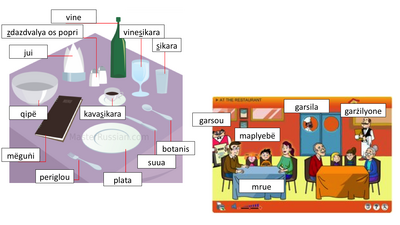
bowl - qipë
chef - garsila
coffee cup - kavas̲ikara
customer - maplyebë
fork - periglou
glass - s̲ikara
host/hostess - garsou
knife - suua
menu - mëguṅi
napkin - jui
pepper - popri
plate - plata
salt - ẕdazdavalya
spoon - botanis
table - mrue
waiter/waitress - garżilyone
wine - vine
wine glass - vines̲ikara
Clothing - Õpetaruu[]
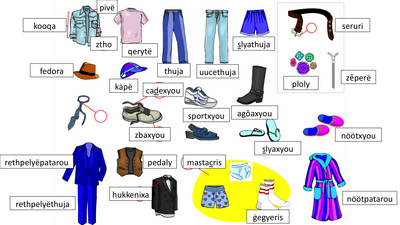
bathrobe - nöötpatarou/agôapatarou
belt - seruri
boots - agôaxyou
button - ploly
cap - käpë
collar - pivë
hat - fedora
jacket - patarou
jeans - uucethuja
pants - thuja
pocket - ztho
sandals - s̲lyaxyou
shirt - qerytë
shorts - s̲lyathuja
shoelace - caḏexyou
sleeve - kooqa
slippers - nöötxyou
sneakers - sportxyou
socks - ġegyeris
sole (of a shoe) - zbaxyou
suit - rethpelyë
suit jacket - rethpelyëpatarou
suit pants - rethpelyëthuja
tie - nixa
underwear - mastac̲ris
vest - pedaly
zipper - zẽperë
Words not included in the picture:
cotton - żeżis
fleece - lyasiso
summer - s̲lya
winter - donge
wool - j̲eplauë
Colors - Klööro[]
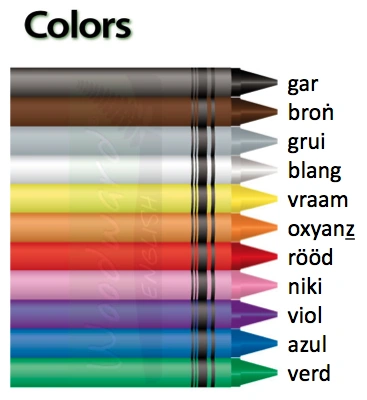
black - gar
blue - azul
brown - broṅ
green - verd
grey - grui
orange - oranẕ
pink - niki
purple - viol
red - rööd
white - blang
yellow - vraam
Farm Animals - Hyales Jîksiqantere[]
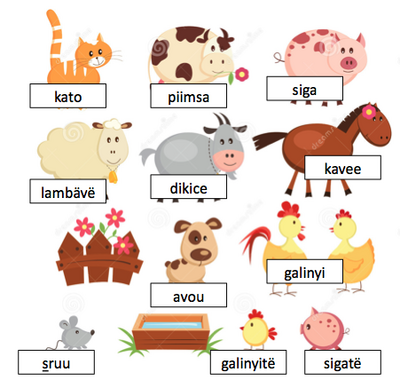
cat - kato
chicken - galinyi (chick - galinyitë)
cow - piimsa
dog - avou
goat - dikice
horse - kavee
mouse - s̲ruu
pig - siga (piglet - sigatë)
sheep - lambävë
The Weather - Tempor[]
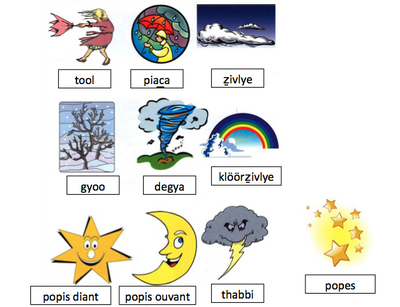
cloud - ẕivlye
day - die
moon - popis ouvant
night - ouvë
rain - piac̲a
rainbow - klöörẕivlye
snow - gyoo
star - popis
sun - popis diant
thunder - thabbi
tornado - degya
wind - tool
Love - Amor[]

love for (dative case) - ...eamo
- ...me - meamo (i.e. meamot, your love for me)
- ...you (sing.) - teamo (i.e. meamo-aly, his/her love for you)
- ...him/her - lyeamo
- ...us - żeamo
- ...you (pl.) - seamo
- ...them - gyeamo
affection for (dative case) - ...etegyë
- ...me - metegyë
- ...you (sing.) - tetegyë
- ...him/her - lyetegyë
- ...us - żetegyë
- ...you (pl.) - setegyë
- ...them - gyetegyë
hate for (dative case) - ...onembis
- ...me - monembis
- ...you (sing.) - tonembis
- ...him/her - lyonembis
- ...us - żonembis
- ...you (pl.) - sonembis
- ...them - gyonembis
attraction to men - atracioni lemist
- man - lemis
- HETEROSEXUALITY AND HOMOSEXUALITY ARE NOT DISTINGUISHED, ALTHOUGH BISEXUALITY IS
- attraction to women - atracioni mulet
- attraction to men and women - atractioni dîġendet
dating - tvace
- dating partner (boyfriend/girlfriend) - hyuroutõ tvacant
- fiancé/e - hyuroutõ ẕaẕmentin
- marriage proposal - serava kasamentant
- engagement - ẕaẕmentis
marriage - kasamenta
- wedding - kasamentõle
- wife/husband - hyuroutõ kasamentant
- anniversary - fëritë kasamantant
- divorce - likasamenta
domestic partner - hyuroutõ ngipant
European Countries - Eiropeos[]
Albania - Albanie
Andorra - Catala
Austria - Ostör
Belarus - Blanghyussi
Belgium - Belẕ
Bosnia and Herzegovina - Boseni o'Herżegovinë
Bulgaria - Bulgaar
Croatia - Kroat/Hrvat
Czech Republic - C̲eska
Denmark - Dinamark
Estonia - Eesti
Finland - Sôomi/Fiin
France - Seiż
Georgia - Ẕorẕiqa
Germany - Alemanya
Greece - Elleti
Hungary - Ungaar/Magyaar
Iceland - Îslän
Ireland - Eir
Israel - Dkov/Lyehudkov
Italy - Donare
Kosovo - Qosovui
Latvia - Letoonia
Liechtenstein - Lixtens̲tein
Lithuania - Lẽtunie
Luxembourg - Lougzembozë
Macedonia - Makedonilya
- Former Yugoslav Republic of Macedonia - Vieẕjugoslavrepublika Makedonilyant
Malta - Malte
Moldova - Moldavie
Monaco - Monaco
Montenegro - Montënnegyru
The Netherlands - Peisbas
Norway - Nohyvaiẕ
Poland - Poulżki
Portugal - Portugal
Romania - Romanna
Russia - Hyussi
San Marino - Sanmarin
Serbia - Sehbie
Slovakia - Sluôakj̲a
Slovenia - Slovena
Spain - Spany
Sweden - Svei
Switzerland - Svic
Ukraine - Lyukrainë
United Kingdom - Peisrojal
Vatican City - Poparei
Example text[]
I give Maria the pen. - Mi mahyo Mariete zumisa.
Pablo wanted to go to the park, but his mom refused to take him. He cried like a baby. - Pablo malidõ mad al hyölur, daly madera-aly gesterõm go balyahyar. Lya jumiredam eto bambinoka.
Aaron wrote some notes down in his notebook with the black pen, but they looked like a secret code. - Aaron skryibam noto in notolibrisilaly garżumisigyena, de je xedikõnim-ko eto sekretvalodanka.

